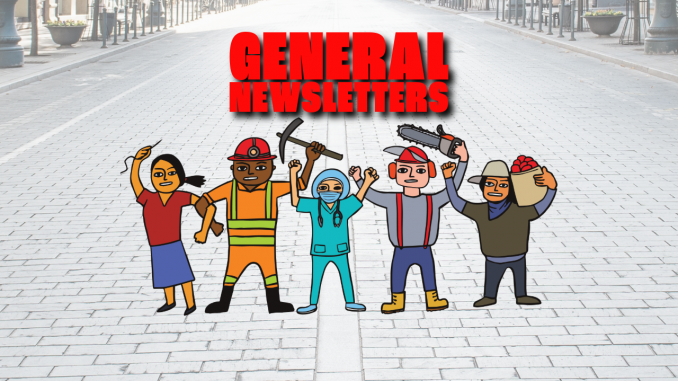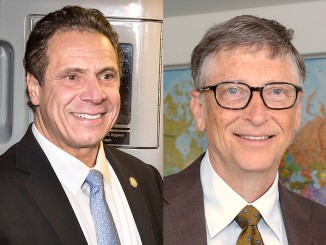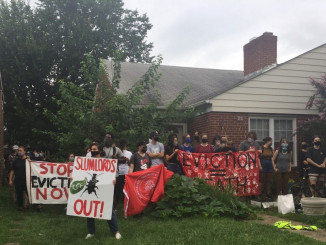
Baltimore Bridge Disaster Didn’t Have to Happen
At 1:28 a.m. on March 26, a massive cargo ship, known as the Dali, collided with Baltimore’s Francis Scott Key Bridge. In seconds most of the structure collapsed, killing six construction workers who were performing pothole repairs on the bridge. Before its collapse, the Key Bridge carried about 35,000 people across the Patapsco River on I-695 each day.
Minutes before the crash, the Dali sent a warning signal that it had lost steering control, allowing just enough time for the bridge to be closed to motorists before the collapse. However, the alert apparently was not passed on to the construction crew, who were on their lunch break in their vehicles at the time. The six men who died in the incident were immigrants from Mexico, Guatemala, Honduras, and El Salvador and lived with their families in Baltimore’s Highlandtown neighborhood and the nearby suburb of Dundalk.
The effects of the bridge collapse are yet to be fully evaluated. The closure of a major highway is already having enormous effects on the commutes of local workers and on the procedures of interstate truckers. What’s more, the debris from the collapse will almost entirely block the Port of Baltimore to incoming and outgoing ships for at least several weeks. Baltimore’s port plays a major role in the trade of many more commodities, supporting over 15,000 jobs on the docks and about 100,000 local jobs overall. The pause in shipments will immediately impact not only these workers and industries, but could also have cascading effects on the operations and workers throughout international supply chains. Environmental effects on the harbor are also sure to accumulate; the chair of the National Transportation Safety Board said that some cargo containers full of hazardous materials fell off the Dali into the water.
It’s also not yet clear what caused the Dali’s loss of control. What we can be sure of, though, is that the practices of the global shipping industry made a tragedy like this all but inevitable. Logistics companies like Maersk, who chartered the Dali, operate with the sole priority of accumulating profit with little regard for safety or other impacts. While Maersk and other shipping companies spend millions lobbying against regulations, workers throughout the notoriously dangerous industry fear for their jobs if they report illegal hazards. Last year, Maersk fired an employee who broke company policy by reporting a safety concern to the government.
Like all businesses, the shipping industry operates to maximize profit. So, cargo container ships have grown in size dramatically in the last few decades. The Dali, not a particularly large cargo ship by today’s standards, is orders of magnitude larger than the largest ships in service when the Key Bridge was constructed in the 1970s.
The closure of the port and a major interstate means an immense blow to the region’s economy, and the immediate and coordinated response by the state and federal governments reminds us that, when the profits of the One Percent are under immediate threat, the politicians will address the crisis. This makes it all the more obvious that politicians’ inaction is deliberate when it comes to the countless other crises that threaten the 99 Percent every day, from the climate catastrophe to the inaccessibility of health care.
The conditions that allowed this disaster are not unique to Baltimore—a similar incident could happen at any of the many major U.S. ports including elsewhere on the East Coast, West Coast, and Gulf Coast. Federal investigators noted that the bridge’s dramatic collapse was due in part to its lack of redundancy—a flaw shared by 17,468 bridges across the country.
It’s clear that the global economy is too important to be left in control of profiteers. Bridges, ports, and trade should serve society at large, getting people the food and other goods that they need. Instead, our world’s most critical infrastructure and logistical operations are controlled and run with a single goal: to make the rich richer.
Taxpayers Foot the Bill for Sports Team Owners
It’s baseball season! But not all news is on the playing field. The Oakland A’s are moving to Las Vegas, and the Baltimore Orioles were bought out by billionaire David Rubenstein. This past year, nearly a dozen multibillion dollar projects for baseball and football stadiums, have been agreed upon — all at taxpayers expense! These owners often claim that moving their team to one city, or building a new stadium, will benefit the community. But often the bill that taxpayers must pay is way more than what new business attracts.
Why should we continue to foot the bill to enrich these billionaire owners? Our sports teams serve a public good and shouldn’t be owned by a wealthy few for their benefit but should be owned and run by the people.
Attacking Free Speech on Social Media
We are experiencing recent attacks on our political expression on social media apps. The U.S. government is threatening to ban TikTok and Meta is now limiting the political content it recommends to Instagram users. Sure, there is obnoxious, bigoted garbage on social media. But these apps have been valuable to share moral outrage over the U.S.’s support of Israel and to organize mobilizations. They were advantageous in previous movements, such as Black Lives Matter. Banning an app or limiting political content will restrict our ability to spread urgent calls.
The risk of political censorship is taking place against a backdrop of an election year and the worsening genocide against Palestinians. Politicians want to secure U.S. dominance over communications networks and the molding of public opinion. Social media is owned by billionaire corporations which do not care about our interests. Instead, it should be a public utility used to share information.
The “Goon Squad”: A Symptom of U.S. Policing
Six police officers have received prison sentences for the racist torture and sexual assault of two Black men in Rankin County, Mississippi. The cops were part of the self-proclaimed “Goon Squad,” which routinely barged into homes without warrants and attacked residents in poor communities for nearly two decades.
While the police officers should be held responsible for their cruelty, that will not fix the racist violence of the U.S. policing system. An investigation of 17 torture incidents, spanning almost 20 years, has corroborated this violence in Rankin County alone. In the U.S., 2023 set a record with 1,232 people killed by the police.
From its start, law enforcement in the U.S. was made with the purpose of using force to intimidate the population and maintain a society based on deep inequality. We must go beyond the courts to truly end police violence. We must fight to end the system that enforces inequality, racism, and insecurity.
AI Won’t Fix the Housing Crisis
Since July 2023, San Jose, California has been working with tech companies to collect data and program artificial intelligence to detect vehicles and tent encampments where unhoused people live so they can better forcibly remove people. San Jose is the first city in the U.S. to roll out such a program. The city, like the rest of the Bay Area, is facing a huge unhoused crisis because of how unaffordable the city is. Since 2009 the unhoused population has gone up 48%.
The solution isn’t to push people out and punish them for being unhoused. Rather, it is to provide affordable and accessible housing to everyone. But doing so would cut into the massive profits that landlords and corporations make by charging sky-high prices for a basic necessity: housing.




